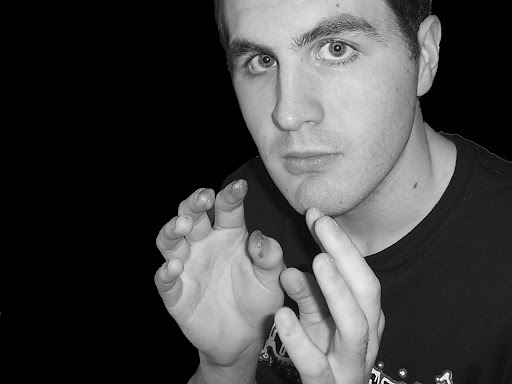It's a tradition of mine to preface any of my printed efforts with excuses to soften its deficiencies, which is why I'm about to tell you that I wrote this in a car on the way to my girlfriend's grandparent's house. Does that exonerate the cliché title? Thought not.
Sowing the seeds of doubt
Originally printed in [crude] magazine, issue two, Feb 09.
It’s a sorry reflection on the state of the human race that there is as much bad information floating around as there is, despite the fact that we are living in the only era of history in which vast nexuses of information are at our fingertips.
Bad information has always circulated in human cultures: conspiracy theories, urban legends, old wives’ tales and false medical advice have propagated as far back as recorded history goes, but in these Googling times, there’s no excuse for it.
Of course, verifying what you’ve heard from others involves more effort than brainlessly parroting it and sounding interesting at parties, but disseminating even the most seemingly benign soundbite is an insidious act. A popular myth that I’ve heard innumerable times is that we only use 10% of our brains – it’s demonstrably incorrect (even a cursory glance at a PET scan would debunk this notion with pretty colours), but it is used every day to bolster belief in psychics and other charlatans who claim to have some supernatural ability.
Blindly accepting these notions seems to have left vast swatches of society with little or no critical faculties, given the amount of people who have been taken in by alternative medicinal scams in lieu of tried-and-trusted modern healthcare. ‘Alternative medicine’ is all marketing, making impressively vague promises of ‘promoting wellness’ and ‘health-boosting properties’, whilst invoking ‘ancient Chinese wisdom’ and ‘taking a holistic approach’.
As the Catholicism of the Irish people is increasingly eroded away by the growing scientific knowledge of the laity, it’s important that we not let peddlers of pseudo-science encroach on our sense of wonder, especially when they make claims about our well-being without any objectively verified proof.
I implore you, dear reader, to take a holistic approach in nixing bad information. Regardless of what perversion of reality you encounter whilst in polite conversation, don’t let it pass unchecked. Whether it’s a mother barring her child from the swimming pool for an hour after lunch; a conspiracy theorist explaining how the twin towers couldn’t have collapsed from a plane crash alone; or a person endorsing their reflexologist, politely inform them that the scientific consensus points to their cherished beliefs being unfounded. They won’t believe you at first, but you’re planting the seeds of doubt that will hopefully lead to a better world for us all.
Despite what you may have heard…
… a goldfish’s memory far exceeds three seconds, and is believed to span at least three months.
… the Great Wall of China can not be seen from the moon with the naked eye, nor can any man-made structure
… smiling uses one more muscle than frowning does (unless it’s a fake smile).
… food eaten just before bed won’t make you fatter than food eaten earlier in the day.
… hair that has been shaved does not grow back thicker or darker.
… the belief that rice thrown at a wedding leads to exploding pigeons is untrue – it poses no threat.
… a duck’s quack does echo.
… Coca-Cola will not dissolve a tooth overnight.
Educate Yourself!
www.snopes.com
An invaluable resource of debunked urban legends and other myths
www.whatstheharm.net
A database linking to news articles of people harmed (and killed) by alternative medicine and other new-age nonsense
www.randi.org
The organisation set up by James Randi, a man who has dedicated his entire life to exposing charlatans and promoting good science
www.quackwatch.org
A site that critically evaluates the claims of alternative medicines, combats medical myths, and highlights the dangerous practices that exist





2 comments:
"Take a holistic approach in nixing bad information"
Nice.
Sadly, the "vast nexuses of information at our fingertips" may actually exacerbate the problem. If you want to maintain a retarded belief, Google is your friend. You'll find an assload of information from similar-minded people to bolster your argument. Faked moon landings, 9/11 as an inside job, aliens covered up at Roswell, the evil machinations of western science, whatever you want to believe.
Around some new roads in Athlone, at least four large signs have been spraypainted with the words "Google NWO".
When it comes to alternative medicine, crackpot conspiracy theories, and the like, confirmation bias is often at the core of it: come up with the idea (which fulfils certain psychological needs), then seek or accept evidence that confirms it while ignoring evidence that contradicts it. As a result, even the most asinine, desperate, stupid-beyond-words belief can be maintained.
*Insert some clever metaphor about seeds and sterile minds*
I agree with your observation that Google can hinder more than help (especially when it places those awful AdSense ads shilling bullshit on sceptical websites), which is why I included those links.
If I want to get to the bottom of some nonsense chain-mail I've received, I don't Google, because Snopes has already done the skeptical heavy-lifting.
Post a Comment